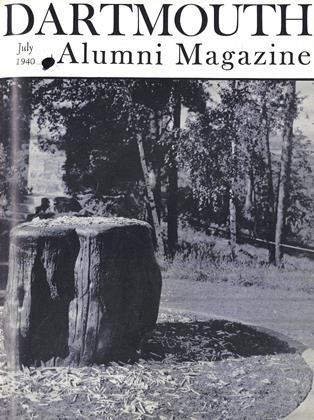STATEMENTS BY PRESIDENT HOPKINS in 1935 and again in 1936 on attitudes of youth in this country in respect to matters of the greatest importance to the welfare of this and other nations are referred to by The Boston Herald in an editorial of May 26. In discussing the reactions of college undergraduates and young men to the European war, the editorial headed "Our Indifferent Youth" says:
"One of the most interesting as well as disturbing phases of America's reaction to the allies' reverses in Europe is the apparent indifference to the outcome of the struggle among our young men. They read the news eagerly and discuss it more intelligently than their fathers and mothers debated the war news of 1914-18. Their chief concern seems not to be the effect of a German triumph on Europe or even on America, but the possibility that they may sometime be obliged to fight for their country.
"It is not difficult to understand and appreciate this attitude. The American generation which has matured in the last ten or fifteen years is thoroughly familiar with the horrors of modern war. They have been dinned into its ears and paraded before its eyes by teachers, books, newspapers, magazines, movies, radio and public orators. These young men naturally and reasonably ask: 'Why should I be anxious to fight in another war—and quite possibly be killed-when ever since I was a kid I have been taught that the last war America fought produced nothing but debts and a terrible depression?'
"There is no simple, direct reply to such a question. War is evil, wasteful, and often futile. There is no softening that fact. But war is sometimes necessary in order to de- fend and preserve those things which a people hold dear—homes, liberties, ideals. The present disquieting situation is that so many young Americans appear today to have no deep loyalties or beliefs for which they would voluntarily make any substan- tial sacrifice.
"President Hopkins of Dartmouth was one of the first educators to note this trend in American youth. Speaking in Boston in 1935 about 'our purposeless youth,' he remarked that 'too frequently one gets the impression of a hitch-hiking generation.' Continuing, he said, 'I doubt that there is a college in the country today that is turning out as large a percentage of its graduates with an ambition to be useful to their fellowmen or to render public service, whether in village, state or nation, as it turned out a century ago.'
"Returning from a summer in Europe in 1936, Mr. Hopkins wrote in the AtlanticMonthly that, although he abhorred all that Hitler, Mussolini, and Stalin stood for, he 'could not be indifferent to many phases of the spirit engendered by the austere and determined purpose which offered no bribe or bounty, but demanded that men and women do something held up to them as duty, cost what it might in suffering, poverty and death.' The self-indulgence, personal acquisitiveness, and apathy toward public duty which he found in the United States, he wrote, came as a shocking contrast.
"On Thursday two Americans of two different generations and of widefy varying politicaf beliefs voiced their anxiety about American youth's attitude in the present world crisis. They are Herbert Hoover and Archibald MacLeish, the young librarian of the Library of Congress. Mr. Hoover, addressing the Boys Clubs of America in Boston, said:
'If freedom is to survive it must prove itself capable of the task. For here in America is the last chance of making the system of liberty vital to men. Unless we can inspire our boys and girls with its vitality, it will have lost its life.'
"Mr. MacLeish put the issue even more bluntly in a speech in New York. 'Unless we regain in this democracy,' he said, 'the conviction that there are final things for which democracy will fight, we can leave our planes unbuilt and our battleships on paper for we shall not need them.'
"Every intelligent American, young or old, hopes and prays that no crisis will arise in the next few years when it will become necessary to fight a war in defense of those 'final things.' "
 View Full Issue
View Full Issue
More From This Issue
-
 Article
ArticleCommencement Climax of 171st Year
July 1940 -
 Class Notes
Class NotesThirtymen Celebrate With Record 265 Reuners
July 1940 By BUD FRENCH '30 -
 Class Notes
Class NotesThirtieth Reunion of 1910
July 1940 By H. P. HINMAN -
 Class Notes
Class NotesGreat Twenty-Fifth for 1915
July 1940 By DONALD C. BENNINK -
 Article
ArticleBaccalaureate, 1940: The Upright Man
July 1940 -
 Article
ArticleDartmouth Remembers' Craven
July 1940
Article
-
 Article
ArticlePHI BETA KAPPA INITIATES TWELVE NEW MEMBERS
JANUARY, 1927 -
 Article
ArticleM. C. Tuttle for Trustee
DECEMBER 1930 -
 Article
ArticleCouncil Meeting
June 1938 -
 Article
ArticleOctober 22 Party
OCTOBER 1971 -
 Article
ArticleREAD WORTHY
May/June 2008 -
 Article
ArticleNorthern California
February 1960 By BASTL t. WINSLOW '20, GUY R. CARPENTER 10


